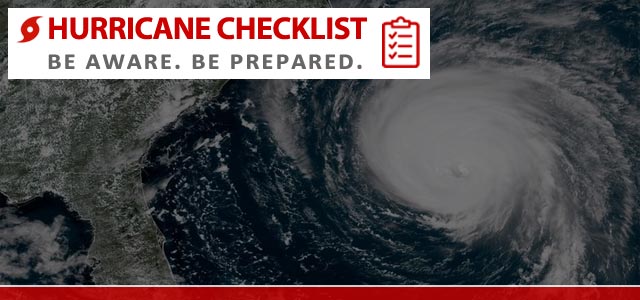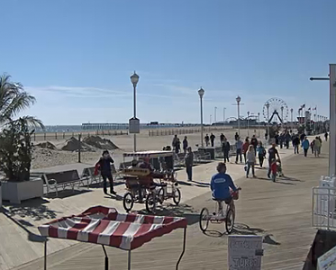Hurricane Checklist
Planning and preparing can make a big difference for your safety during hurricane. Hurricanes bring high winds, heavy rainfall, storm surge, coastal flooding, inland flooding, and even tornados.

75 million people in the United States live in the path of hurricanes. The heavy winds and storm surge of a major hurricane can cause destroy homes, close roads, cause sustained power outages, and disrupt access to clean water. The effects from a major hurricane can extend from the coast to several hundred miles inland.
Don’t wait until a hurricane watch is issued in your area, it may already be too late to prepare and take certain precautions.
How to Prepare for a Hurricane
Use this hurricane checklist as a starting point, add items we’ve overlooked, and cross off items that do not apply to you.
Prepare & Stay Informed
- Listen to weather alerts for up-to-date information from the National Weather Service
- If your area is told to evacuate, evacuate
- Fill your gas tank as early as possible
Food & Water
- Drinking water: 1 gallon per person per day
- Water for cooking and hygiene: 1 gallon per person per day
Non-perishable food for at least 7 days
- Canned meats, soup
- Packaged fruits and vegetables
- Canned or boxed juice & drinks
- Bread, crackers, cereal
- Special food for babies and the elderly
- Peanut butter and jelly
- Granola bars, Trail mix
Emergency Essentials
- Two week supply of prescription drugs
- Two week supply of vitamins
- Over the counter pain reliever
- Toiletries and hygiene items
- First Aid Kit
- Sunscreen
- Mosquito repellant
- Plastic garbage bags
- Antibacterial soap
Household Items
- Cooler for ice and food storage
- Flashlights with extra batteries
- Car charger for cell phones
- Grill with extra propane or charcoal
- Waterproof matches
- Paper plates, utensils, bowls and cups
- Napkins, paper towels and toilet paper
- Outdoor extension cords
- Multi-purpose tool, scissors, knife
- Bring in all outdoor furniture, garbage cans and anything else that is not tied down.
Personal Items
- Collect and safeguard critical financial, medical, educational, and legal documents.
- Secure any items that are irreplaceable or may provide comfort to your family, especially your children.
- Extra cash
Pet safety tips
- Make sure that cats and dogs have collars and identification tags
- Put your cellphone number on your pet’s tag
- Find a safe place to stay
- Never assume you will be allowed to bring your pet to an emergency shelter
- Bring your pet with you if you evacuate
- Food and water for each pet for at least five days
Staying Safe During a Storm
- Follow local news for the latest updates.
- For protection from high winds, stay away from windows and seek shelter on the lowest level in an interior room.
- Move to higher ground if there is flooding or a flood warning.
- Call 9-1-1 if you are in life threatening danger.
What to Do After Hurricane Passes
- Follow local news for the latest updates.
- Return home only when officials say it is safe.
- Avoid roads that are flooded.
- Report dangling power lines immediately to the power company.
- Stay clear of buildings that has water around it.
- Inspect your home for damage. Take pictures for insurance purposes.
- Avoid drinking or preparing food with tap water until you are sure it’s safe.
[/checklist-box]









